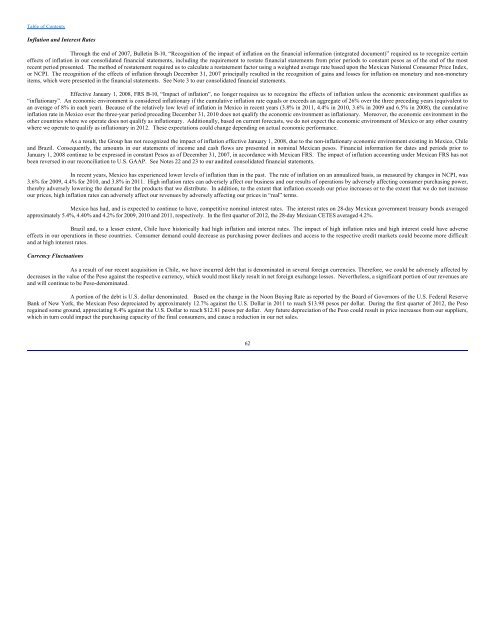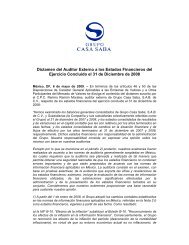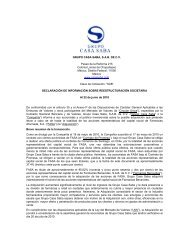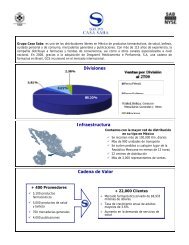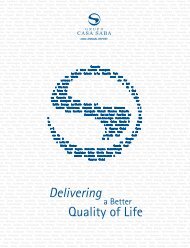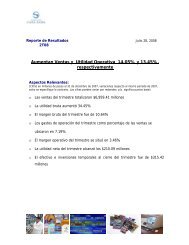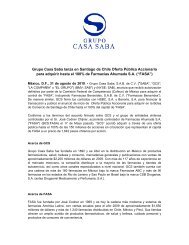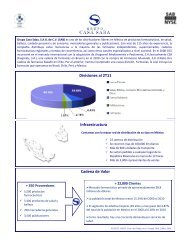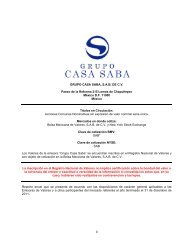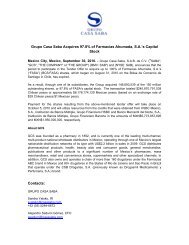FORM 20-F Grupo Casa Saba, S.A.B. de C.V.
FORM 20-F Grupo Casa Saba, S.A.B. de C.V.
FORM 20-F Grupo Casa Saba, S.A.B. de C.V.
You also want an ePaper? Increase the reach of your titles
YUMPU automatically turns print PDFs into web optimized ePapers that Google loves.
Table of Contents<br />
Inflation and Interest Rates<br />
Through the end of <strong>20</strong>07, Bulletin B-10, “Recognition of the impact of inflation on the financial information (integrated document)” required us to recognize certain<br />
effects of inflation in our consolidated financial statements, including the requirement to restate financial statements from prior periods to constant pesos as of the end of the most<br />
recent period presented. The method of restatement required us to calculate a restatement factor using a weighted average rate based upon the Mexican National Consumer Price In<strong>de</strong>x,<br />
or NCPI. The recognition of the effects of inflation through December 31, <strong>20</strong>07 principally resulted in the recognition of gains and losses for inflation on monetary and non-monetary<br />
items, which were presented in the financial statements. See Note 3 to our consolidated financial statements.<br />
Effective January 1, <strong>20</strong>08, FRS B-10, “Impact of inflation”, no longer requires us to recognize the effects of inflation unless the economic environment qualifies as<br />
“inflationary”. An economic environment is consi<strong>de</strong>red inflationary if the cumulative inflation rate equals or exceeds an aggregate of 26% over the three preceding years (equivalent to<br />
an average of 8% in each year). Because of the relatively low level of inflation in Mexico in recent years (3.8% in <strong>20</strong>11, 4.4% in <strong>20</strong>10, 3.6% in <strong>20</strong>09 and 6.5% in <strong>20</strong>08), the cumulative<br />
inflation rate in Mexico over the three-year period preceding December 31, <strong>20</strong>10 does not qualify the economic environment as inflationary. Moreover, the economic environment in the<br />
other countries where we operate does not qualify as inflationary. Additionally, based on current forecasts, we do not expect the economic environment of Mexico or any other country<br />
where we operate to qualify as inflationary in <strong>20</strong>12. These expectations could change <strong>de</strong>pending on actual economic performance.<br />
As a result, the Group has not recognized the impact of inflation effective January 1, <strong>20</strong>08, due to the non-inflationary economic environment existing in Mexico, Chile<br />
and Brazil. Consequently, the amounts in our statements of income and cash flows are presented in nominal Mexican pesos. Financial information for dates and periods prior to<br />
January 1, <strong>20</strong>08 continue to be expressed in constant Pesos as of December 31, <strong>20</strong>07, in accordance with Mexican FRS. The impact of inflation accounting un<strong>de</strong>r Mexican FRS has not<br />
been reversed in our reconciliation to U.S. GAAP. See Notes 22 and 23 to our audited consolidated financial statements.<br />
In recent years, Mexico has experienced lower levels of inflation than in the past. The rate of inflation on an annualized basis, as measured by changes in NCPI, was<br />
3.6% for <strong>20</strong>09, 4.4% for <strong>20</strong>10, and 3.8% in <strong>20</strong>11. High inflation rates can adversely affect our business and our results of operations by adversely affecting consumer purchasing power,<br />
thereby adversely lowering the <strong>de</strong>mand for the products that we distribute. In addition, to the extent that inflation exceeds our price increases or to the extent that we do not increase<br />
our prices, high inflation rates can adversely affect our revenues by adversely affecting our prices in “real” terms.<br />
Mexico has had, and is expected to continue to have, competitive nominal interest rates. The interest rates on 28-day Mexican government treasury bonds averaged<br />
approximately 5.4%, 4.40% and 4.2% for <strong>20</strong>09, <strong>20</strong>10 and <strong>20</strong>11, respectively. In the first quarter of <strong>20</strong>12, the 28-day Mexican CETES averaged 4.2%.<br />
Brazil and, to a lesser extent, Chile have historically had high inflation and interest rates. The impact of high inflation rates and high interest could have adverse<br />
effects in our operations in these countries. Consumer <strong>de</strong>mand could <strong>de</strong>crease as purchasing power <strong>de</strong>clines and access to the respective credit markets could become more difficult<br />
and at high interest rates.<br />
Currency Fluctuations<br />
As a result of our recent acquisition in Chile, we have incurred <strong>de</strong>bt that is <strong>de</strong>nominated in several foreign currencies. Therefore, we could be adversely affected by<br />
<strong>de</strong>creases in the value of the Peso against the respective currency, which would most likely result in net foreign exchange losses. Nevertheless, a significant portion of our revenues are<br />
and will continue to be Peso-<strong>de</strong>nominated.<br />
A portion of the <strong>de</strong>bt is U.S. dollar <strong>de</strong>nominated. Based on the change in the Noon Buying Rate as reported by the Board of Governors of the U.S. Fe<strong>de</strong>ral Reserve<br />
Bank of New York, the Mexican Peso <strong>de</strong>preciated by approximately 12.7% against the U.S. Dollar in <strong>20</strong>11 to reach $13.98 pesos per dollar. During the first quarter of <strong>20</strong>12, the Peso<br />
regained some ground, appreciating 8.4% against the U.S. Dollar to reach $12.81 pesos per dollar. Any future <strong>de</strong>preciation of the Peso could result in price increases from our suppliers,<br />
which in turn could impact the purchasing capacity of the final consumers, and cause a reduction in our net sales.<br />
62


